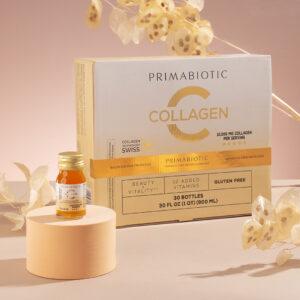Is Your Skin Dry and Less Elastic? Experiencing Wrinkles? Hair Falling Out Excessively? Nails Brittle and Fragile? These could be signs of collagen deficiency. Collagen is a crucial structural element of our skin and plays a significant role in the healthy appearance of hair and nails. Due to its biological properties, collagen is widely used in cosmetics, aesthetic medicine, and dietary supplements.
Collagen Benefits for Skin
The human skin is the largest organ in our body, performing a range of essential protective, regulatory, and aesthetic functions. One of the key elements responsible for skin health, elasticity, and a youthful appearance is collagen. It is the main component of the extracellular matrix and a vital protein in the skin.
Collagen acts as a framework that stabilizes the structure of the dermis. It ensures continuous cellular renewal processes in the skin and helps maintain proper hydration levels. This results in a healthy-looking, resilient, elastic, and durable skin condition. However, with age, the rate of collagen synthesis in the skin decreases, its solubility declines, and collagen fibers become thinner.
Reduced collagen production and increased degradation can lead to slower wound healing. Additionally, lower collagen levels make the skin less resistant to mechanical factors. Collagen deficiency also weakens facial muscles, contributing to the formation of wrinkles.
One way to counteract these phenomena is by replenishing collagen with high-quality supplements. Collagen hydrolysates can promote endogenous collagen production and reduce the activity of enzymes responsible for its degradation, potentially delaying skin aging and smoothing wrinkles.
A key role of collagen is to maintain the skin’s hydration. In combination with elastin, collagen forms a dense network of elastic fibers in the dermis that not only gives the skin elasticity but also binds water and lipids. A common sign of collagen deficiency is excessive dryness of the skin.
Dryness, especially of the stratum corneum, can result in a dull and “tired” appearance. A well-hydrated stratum corneum allows its cells to be more elastic and adhere better to one another, giving the skin a radiant, smooth, and soft look.
Collagen may also help reduce cellulite and stretch marks. As the skin becomes thinner and less elastic due to declining collagen levels in the body, supplementation can improve skin tension, making imperfections less visible. Collagen also aids in faster wound healing, reducing scarring, and may assist in treating burns.
Collagen Benefits for Hair
Hair, a keratinized structure of the epidermis found in mammals, including humans, plays important biological and social roles. Hair protects us from UV radiation and injuries and helps regulate body temperature by providing insulation. It also acts as a sensory receptor, warning us of potential dangers.
From an aesthetic standpoint, hair is a vital part of our identity, allowing us to express style and culture. Strong, shiny hair is often a symbol of good health, which can boost overall well-being. Hair also serves a protective role for the eyes and face; eyelashes and eyebrows shield the eyes from dust and sweat while enhancing emotional expression and facial features.
Collagen supplementation can support individuals dealing with weak hair. By strengthening hair follicles and improving the overall structure of the hair, collagen promotes health, shine, and elasticity.
Collagen for Hair Loss
Hair loss is a concern affecting many people, regardless of age or gender. One potential cause is a deficiency in key proteins, including collagen, which is crucial for the health of the scalp and hair. Signs may include thin, dry, and brittle hair. Collagen supplementation can help reduce hair loss by strengthening follicles and improving scalp circulation.
Collagen for Hair Growth
Healthy hair requires proper hydration, nourishment, and a strong foundation, which proteins like collagen provide. Supplementing with collagen may stimulate hair follicles, encouraging the growth of new, stronger strands. Collagen supplies the amino acids needed to build keratin, the main component of hair.
Regular collagen intake can help achieve thicker, healthier, and shinier hair. This is particularly important for individuals experiencing thinning or damaged hair.
Proper scalp cleansing with a suitable shampoo that removes excess sebum and impurities also enhances nutrient absorption. This creates better conditions for collagen supplementation to be effective. Remember – a healthy scalp promotes better hair growth.
Is Collagen Good for Nails?
Collagen is also one of the key building blocks of nails, providing the necessary structure, elasticity, and durability. Regular consumption of this protein can significantly improve nail health, making them stronger, less brittle, and more resistant to mechanical damage.
Collagen works from within, strengthening the nail matrix and stimulating healthy growth. Supplementing with collagen is particularly recommended for those with brittle, splitting nails that require additional support for regeneration.
What Causes Brittle Nails?
Weak, brittle nails may indicate dietary deficiencies, particularly in vitamins and minerals. Insufficient levels of biotin, zinc, silicon, and B vitamins can weaken nail structure, leading to splitting and white spots. Additionally, inadequate hydration and protein intake can negatively affect nail health.
In such cases, collagen supplementation can be essential to provide the body with the amino acids needed to rebuild and strengthen nails. This protein works synergistically with other nutrients, enhancing their effects and speeding up regeneration.
Collagen Drinks for Skin, Hair and Nails
Collagen drinks are an effective way to improve the overall condition of skin, hair, and nails. They not only strengthen nails but also enhance skin elasticity, hydration, and hair health. Regular collagen consumption may reduce wrinkles, increase hair density, and decrease hair breakage.
Consider incorporating collagen into your daily diet to enjoy a healthy and beautiful appearance. Vitamins A, C, and E act as antioxidants that support proper collagen synthesis. When using collagen-based products, remember to also include these vitamins, especially vitamin C, which directly participates in collagen fiber formation.
Check out similar articles:
